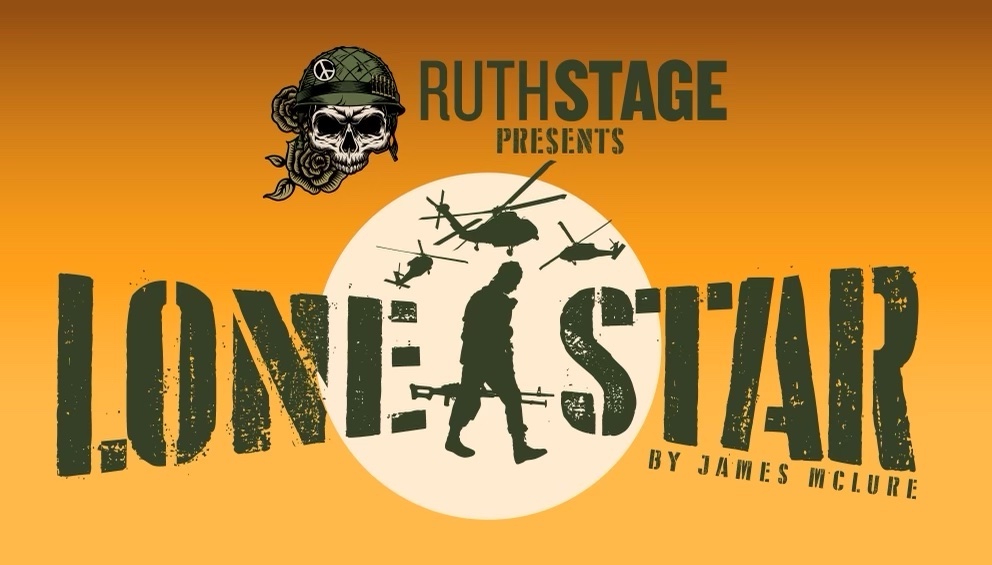Interview by Chris Carver . . . .
Recently, I had the pleasure of seeing Ruth Stage’s newly reimagined production of James McClure’s play Lone Star, currently running Off-Broadway at Theater Row. This creatively revamped version incorporates aspects of McClue’s sister play Laundry and Bourbon into the script, as well as aspects of an abandoned screenplay from the early 1980s. I was able to chat with cast members Matt De Rogatis, Dan Amboyer, Ryan McCartan, Ana Isabelle, and Director Joe Rosario about this exciting and novel approach to this classic play.
Joe, as director what made you decide to incorporate aspects of ‘Laundry and Bourbon” into this production?
JOE: One thing we like to do at Ruth Stage is mix things up a bit. Thanks to our relationship with the McClure family, we were given permission to incorporate all works that are connected to Lone Star. This production is the end result of that effort.
How much of the aborted 1980s screenplay did you wind up incorporating?
JOE: It’s hard to give a percentage. Let’s just say we cherry-picked everything that was available to us in order to give the audience the best experience. My job as director is to create the world and mood to allow my wonderful cast the space and breath to create and thrive.

Ana, you play the wife of the main character and the only character brought over from Laundry and Bourbon. The beginning of the play is you alone on stage. What has been the biggest challenge in playing this role?
ANA: A big challenge has been to work on Elizabeth’s emotional journey when she is talking and singing non-stop for the first 25 minutes of the play. It’s been fun to sit down with the text for months to analyze it, memorize it, and make it my own. It’s been beautiful to accept the challenge of singing on an Off-Broadway stage, me and my guitar only, and trusting we are enough!
The show begins with Elizabeth delivering an extended monologue to the audience. Why this choice instead of a scene partner for the Elizabeth character?


JOE: Again we wanted to try something different. If we started giving Elizabeth scene partners you have Laundry and Bourbon. We redefined Elizabeth’s role to be more personal. More of a backstory for Roy and what once was, before he went to Viet Nam.
There was a lot of live music and filmed projection added to this production. What was the significance of adding the specific music to this piece?
JOE: When putting together a production everything has an equal significance because they are all interconnected to the final piece. In this case, the guitar is a huge component of Elizabeth’s inner pain. She finds solace and peace in the beauty and sound of her guitar. It helps her cope with Roy.
Ana, you had an original song in this production. How did that come about?
ANA: Joe wanted a song in Spanish. This year I released two songs and “Heys” lyrics worked perfectly for the story. I’m really proud and grateful to bring a piece of me to this wonderful script.
This is a play that emphasizes relationships. What was it like for each of you exploring these characters?
DAN: I love that Ray is often unintentionally funny, and though he is a “simple man,” he has a deep undercurrent and rich emotional life. I wanted to explore those concurrent and opposite attributes—to dare myself to stuff as much vitality and vulnerability into the role as possible.


MATT: This is my fourth production now playing Roy and each time I love him more and find more layers to him. The play in general is just so fun and such a hidden gem and it’s just not produced enough. The themes of the play are universal and Roy is such a rich character.
RYAN: The play itself is simply excellent. It’s complicated, funny; but most enticingly, contains a secret. A big secret. The audience then finds out about another secret, and another secret, until the whole play is flipped on its head. My character, Cletis, is the holder of one of these big secrets, and I’ll take every chance I can get to play a character who comes in to cause a little chaos.
These characters definitely have their rough edges. Do you personally relate with their struggles?
DAN: I connect with Ray’s struggle to help his brother, help do his absolute best to save him. Roy is unwell, dealing with a lot of trauma and addiction. As much as he’d like, things can never actually go back to “the way they were,” and sometimes it takes absolute rock bottom to turn someone around. That’s very hard to witness. Many of us have been personally affected by addiction—whether something we struggle with ourselves or feeling powerless to help someone overcome their own demons.
MATT: There’s a lot to empathize with. He’s dealing with serious symptoms of PTSD. On some level, I know what that is like. I have never been to war and seen those horrors, but life is tough for us all and things happen and they can cause damage—PTSD being one of them. Mental health is a big topic today and Roy is clearly wrestling with a lot of demons. He’s depressed, he’s stuck in the past, he’s an alcoholic, his marriage is falling apart, he has no relationships anymore. War really messed this guy up and while there’s a lot of humor in the play, I’m more drawn to the dark side of Roy.


Ana, you only have one short scene in the show with the character of your husband; however, he is a major presence in your story. What did you use from Matt’s performance to inform you?
ANA: Watching Matt’s performance of Roy during our rehearsals gave me exactly what I needed to have a clear picture of Roy’s demeanor, sex appeal, and also his pain. I use some of his lines, his voice, the way he screams or complains, to feed my imagination. Matt is great and knows the play so well! He is really passionate when he plays Roy and it’s been really helpful to see him on stage.
This play was originally produced in the 1970s. Do you feel it still resonates with today’s audience?
MATT: This play is about life. It’s timeless. It’s about relationships and secrets. It’s about war and alcoholism. Mental health, broken relationships, brotherhood, family, hanging onto the past, not being able to let go of one’s youth. These are all universal themes. If we do our jobs as actors, I think this play should resonate with audiences, not only today but 50 years from now, too.
DAN: Absolutely. PTSD, alcoholism, addiction, brotherhood, and war are all things very much still present in the world around us. I’ve been watching a lot of YouTube first-hand accounts and interviews of Vietnam vets, PTSD survivors, addicts, etc—there’s a lot of people out there dealing with these issues.
RYAN: To paraphrase the play, when you want to return to a place in your mind, you want it to be how it was, not how it is. I don’t think it matters what year it is, or what the subject matter is. If a piece of art can make you laugh, think, and see yourself in the characters you’re experiencing, it’s going to resonate.


What do you hope audiences take from this production?
DAN: I hope our audiences feel the love of two family members, the relentless hope Ray feels for his brother to overcome his trauma and demons. That if you have one person who stands by you through the worst of it all, you can make it. And sometimes, when you think you’re all alone, maybe take another look around you.
MATT: I hope they take away that plays like this still need to be made. The NYC theater landscape has drastically changed. I have always felt that the really great stuff happens Off-Broadway and Lone Star is no different. I hope they take away an appreciation for what our veterans have gone through. As my mentor used to say, “These are real things happening to real people.” It might be a few actors up there performing a literary work, but these things are happening in the world. I just hope that it makes them think and feel.
RYAN: Generally, I hope audiences have a great time with a piece of theater they’ve probably never heard of before. Lone Star isn’t often produced and it, along with so many great plays, is representative of an entire lexicon of material waiting to be discovered by new audiences.
Joe, why was now the right time for Lone Star to be revived?
JOE: What’s going on in the world, in this country right now, this second, screams out for a play like Lone Star to be resurrected. The backdrop of Lone Star was a world in turmoil, at war, a generation full of questions, some with the right answers, some misguided. Young men and women leaving home only to come home in a body bag, maimed, deformed, mentally compromised, socially cast aside, drug addicted, and alcoholic. Treated like dirt. Even though Lone Star is a dark comedy filled with extremely funny moments, it doesn’t fall short in reminding the audience that there was a forgotten soldier who dealt with an unknown phenomenon, later called PTSD, who was just looking for a little respect when he got home.
Lone Star is currently running thru December 23 at Theater Row (410 West 42nd Street, between Ninth and Tenth Avenues). www.ruthstage.org
Photos courtesy of Ruth Stage


















